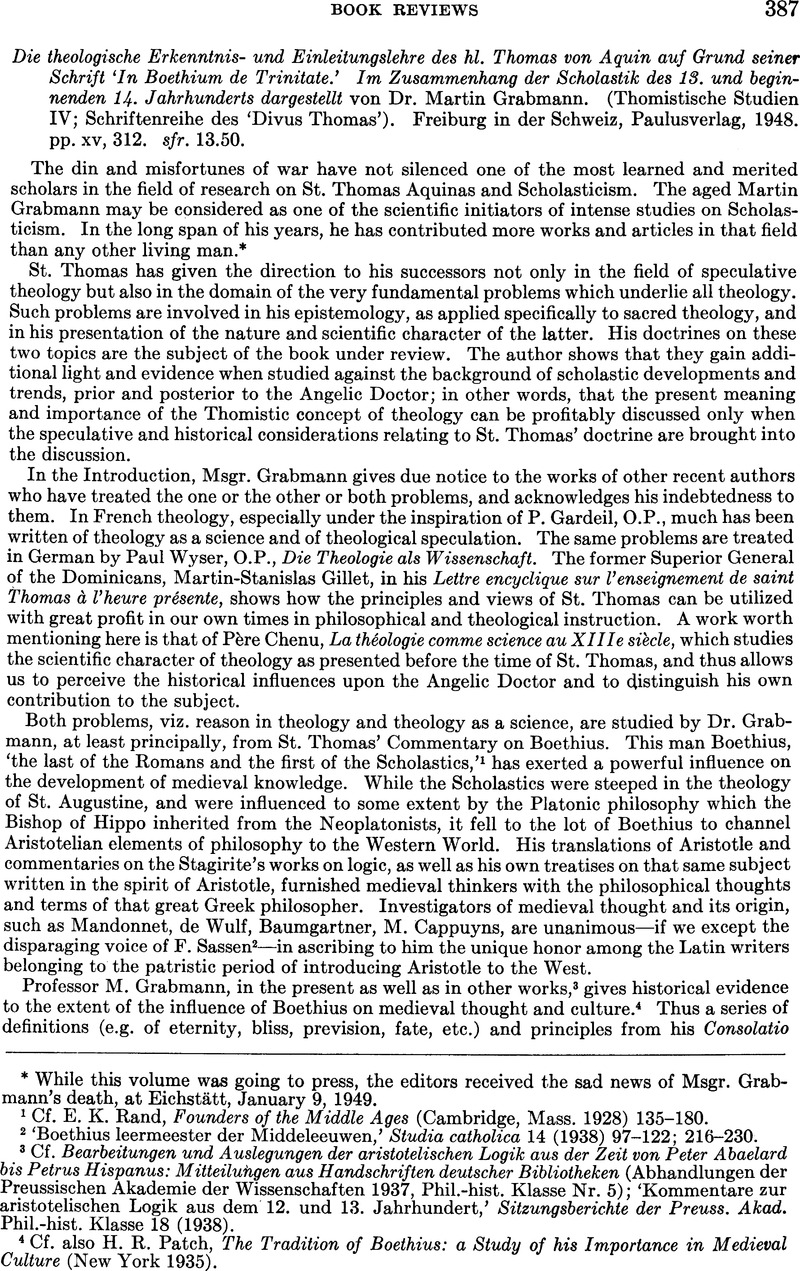No CrossRef data available.
Article contents
Die iheoloqische Erkenntnis- und Einleitungslehre des hl. Thomas von Aquin auf Grund seiner Schrift ‘In Boethium de Trinitate.’ 1m Zusammenhang der Scholastik des 13. und beginnenden 14. Jahrhunderts dargestellt von Dr. Martin Grabmann. (Thomistische Studien IV; Schriftenreihe des ‘Divus Thomas’). Freiburg in der Schweiz, Paulusverlag, 1948. pp. xv, 312. sfr. 13.50.
Published online by Cambridge University Press: 29 July 2016
Abstract

- Type
- Book Reviews
- Information
- Copyright
- Copyright © 1948 by Cosmopolitan Science & Art Service Co., Inc.
References
∗ While this volume was going to press, the editors received the sad news of Msgr. Grabmann’s death, at Eichstätt, January 9, 1949.Google Scholar
1 Cf. Rand, E. K., Founders of the Middle Ages (Cambridge, Mass. 1928) 135–180.Google Scholar
2 ‘Boethius leermeester der Middeleeuwen,’ Studia catholica 14 (1938) 97–122; 216–230.Google Scholar
3 Cf. Bearbeitungen und Auslegungen der aristotelischen Logik aus der Zeit von Peter Abaelard bis Petrus Hispanus: Mitteilungen aus Handschriften deutscher Bibliotheken (Abhandlungen der Preussischen Akademie der Wissenschaften 1937, Phil.-hist. Klasse Nr. 5); ‘Kommentare zur aristotelischen Logik aus dem 12. und 13. Jahrhundert,’ Sitzungsberichte der Preuss. Akad. Phil.-hist. Klasse 18 (1938).Google Scholar
4 Cf. also Patch, H. R., The Tradition of Boethius: a Study of his Importance in Medieval Culture (New York 1935).Google Scholar
5 Littérature latine au moyen âge depuis les origines jusqu’à la fin de la renaissance carolingienne (Paris 1939) 18.Google Scholar
6 Cf. Silk, E. T., ‘Boethius’ Consolatio Philosophiae as a Sequel to Augustine’s Dialogues and Soliloquia,’ Harvard Theological Review 32 (1939) 18–39.Google Scholar
7 Der göttliche Grund menschlicher Wahrheitserkenntnis nach Augustinus und Thomas von Aquin: Forschungen über die Augustinische Illuminationstheorie und ihre Beurteilung durch den hl. Thomas von Aquin (Münster 1924) 57ff.Google Scholar
8 Cf. ‘Pourquoi saint Thomas a critiqué saint Augustin,’ Archives d’histoire doctrinale et littéraire du moyen âge (1926–7) 318; also in his Introduction à l'étude de saint Augustin (2me éd.; Paris 1943) Google Scholar
9 ‘Saint Thomas et saint Augustin d’après M. Gilson,’ Gregorianum 8 (1927) 106–110; id. ‘La philosophie augustinienne ignore-t-elle l’abstraction?’ Nouvelle Revue théologique 10 (1930).Google Scholar
10 ‘Thomae Aquinatis cum Augustino de illuminatione concordia,’ Divus Thomas 31 (1928) 50–82; id. ‘Utrum Deus moveat immediate intellectum creatum,’ Xenia Thomistica (Romao 1925) 155–185.Google Scholar


